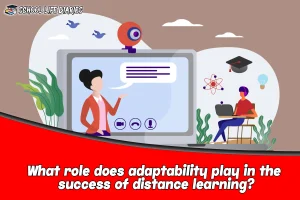Distance learning has become increasingly popular in recent years, offering advantages for students and parents and a flexible alternative to traditional classroom education. This method of learning allows students to access educational materials and interact with teachers through online platforms, eliminating the need for physical attendance.
With distance learning, students have the freedom to learn at their own pace and convenience. They no longer have to adhere to rigid schedules or commute long distances to attend classes. This flexibility allows them to take control of their education and pursue other interests or responsibilities alongside their studies.
For parents, distance learning provides an opportunity to actively engage in their child’s education by monitoring their progress more closely. They can collaborate with teachers in real time through virtual platforms and gain insights into the curriculum being taught. This involvement fosters a stronger parent-teacher-student partnership that enhances academic outcomes for the child.
What is Distance learning?
Distance learning is a modern educational approach that allows students to acquire knowledge and skills through virtual platforms, fostering a sense of adaptability and self-discipline while ensuring access to quality education regardless of geographical constraints. One of the key benefits of distance learning is the flexibility it offers. Students can access their course materials and assignments at any time, allowing them to learn at their own pace and fit their studies around other commitments such as work or family responsibilities.
This flexibility also enables students to study from anywhere in the world, eliminating the need for costly travel or relocation. Students may struggle with managing their time effectively and staying motivated without regular face-to-face interactions with instructors and peers. The lack of immediate feedback can also be challenging, as students may have to wait longer for responses to their queries or concerns. Additionally, technical issues such as internet connectivity problems can hinder the learning experience for some students.
For parents, distance learning offers convenience by eliminating the need for commuting or arranging transportation for their children. They can actively participate in their child’s education by providing support at home and monitoring their progress more closely through online platforms that provide real-time updates on grades and performance.
Why Distance learning is important?
Online education has become an essential aspect of modern education systems due to its ability to provide flexible and accessible learning opportunities for individuals of all backgrounds. One of the key advantages of distance learning is its potential to improve accessibility. With online education, students are not limited by geographical constraints or physical disabilities. They can access educational resources and interact with instructors from anywhere in the world, allowing them to pursue their academic goals without any hindrance.
Another significant advantage of distance learning is its ability to promote self-discipline among students. In an online environment, learners must take responsibility for managing their time effectively and staying motivated without constant supervision. This fosters the development of self-discipline skills that are valuable not only in an academic setting but also in professional and personal life.
7 Best Advantages of distance learning for students:
One notable benefit of pursuing education remotely is the liberation from constraints related to location and physical limitations, allowing individuals to access educational resources and connect with instructors worldwide. Distance learning eliminates the need for students to be physically present in a specific location, opening up opportunities for them to study at their own convenience.
Whether it’s a student living in a remote area with limited access to educational institutions or an individual with physical disabilities, distance learning provides equal opportunities for everyone to pursue their educational goals. The impact of distance learning on students’ lives can be immense. It offers flexibility in terms of scheduling, allowing students to balance their studies with other commitments such as work or family responsibilities.
This advantage is particularly beneficial for non-traditional students who may have full-time jobs or are adult learners seeking further education while managing other life responsibilities. By eliminating the need for commuting and adhering to fixed class schedules, distance learning enables students to create a personalized learning environment that suits their needs.
One significant advantage of distance learning is the freedom it offers in terms of location and physical limitations. The impact on students’ lives is substantial as it provides flexibility in scheduling and enables them to balance various responsibilities effectively. Furthermore, the success of this mode of education lies in its provision of extensive resources and global instructor connections that contribute significantly to students’ academic growth and development.
7 Best Advantages of Distance Learning for Parents and Educators:
The convenience and accessibility of remote education allow parents and educators to engage in collaborative efforts, fostering a dynamic learning environment that transcends physical boundaries. From the parents’ perspective, distance learning offers them the opportunity to actively participate in their child’s education. With online platforms and digital tools, parents can easily monitor their children’s progress, access educational resources, and communicate with teachers. This level of involvement empowers parents to be more engaged in their child’s learning journey.
The impact of distance learning on education is significant as it introduces innovative teaching methods that cater to different learning styles. It encourages educators to integrate multimedia resources into their lessons, making them more interactive and engaging for students.
The advantages of distance learning for parents and educators are manifold. Parents can actively participate in their child’s education while educators have more flexibility in delivering tailored lessons and facilitating collaboration among students. The impact on education is profound as it allows for innovative teaching methods and personalized instruction that cater to diverse learner needs. Embracing remote education opens up new possibilities for creating a dynamic learning environment beyond traditional physical boundaries.
How distance learning can help us to improve Life Skills?
Distance learning offers a valuable opportunity for individuals to enhance their life skills through interactive and adaptable educational platforms. This not only helps them develop effective written communication skills but also encourages them to express their thoughts and ideas more confidently. This requires self-discipline and the ability to set goals, prioritize tasks, and meet deadlines independently. By taking responsibility for their own learning journey, students can cultivate a sense of accountability and develop strong organizational skills that will benefit them beyond academics.
Distance learning provides an excellent opportunity for individuals to improve important life skills such as communication, self-discipline, and critical thinking. By engaging in interactive online platforms that encourage active participation and independent learning, students can enhance these skills while pursuing their academic goals. The flexibility of distance learning also empowers learners to take ownership of their education journey which further strengthens their overall personal growth and development.
What difficulties you will face in distance learning?
One of the major difficulties faced by students is the lack of face-to-face interaction with teachers and peers. In a traditional classroom setting, students have the opportunity to ask questions immediately and receive instant feedback. This can result in a slower learning process and reduced engagement. This independence can be overwhelming for some individuals, leading to procrastination or a lack of focus on assignments. To overcome these challenges, there are several solutions and tips that can help students navigate through distance learning successfully.
While distance learning offers numerous advantages such as flexibility and accessibility, it also presents its fair share of challenges for both students and parents alike. By recognizing these obstacles and implementing appropriate solutions such as effective communication strategies, strong time management skills, and motivation techniques; individuals undertaking distance education can overcome difficulties more effectively while maximizing their learning potential.
How does distance learning promote time management skills among students?
One key aspect of distance learning is the cultivation of effective time management skills, allowing students to efficiently allocate their study sessions and complete assignments in a timely manner. With the flexibility of scheduling, students have the freedom to plan their study sessions around their personal commitments and responsibilities. This empowers them to create a balanced routine that optimizes their productivity and ensures they meet deadlines.
The importance of self-discipline cannot be overstated when it comes to distance learning and its impact on time management skills. Without the direct supervision of teachers or classmates, students must rely on self-motivation and discipline to stay focused on their studies. The ability to manage one’s time effectively is a valuable skill that extends beyond academics; it fosters a sense of responsibility and organization in all aspects of life.
Distance learning promotes time management skills among students through its provision of various strategies for effective planning and execution of study sessions. The benefits of flexible scheduling enable learners to create a balanced routine that meets both academic requirements and personal commitments. As distance learning continues to gain popularity, the development of time management skills becomes increasingly crucial for students seeking success in their educational pursuits.
Can distance learning help students become more proactive and independent learners?
Distance learning requires students to take charge of their own education, as they are responsible for managing their time, completing assignments, and staying motivated without constant supervision from teachers. This increased level of independence encourages students to become more self-motivated and engaged in their studies.
Students must actively seek out information, interact with online resources, and engage in discussions with peers through virtual platforms. This active engagement fosters a deeper understanding of the subject matter and allows students to develop critical thinking skills as they analyze information independently.
Distance learning also helps students develop self-motivation. Without the physical presence of teachers or classmates to provide external motivation, students must rely on internal drive to stay focused and committed to their studies. They learn to set goals for themselves, manage their time effectively, and overcome challenges on their own. These skills not only benefit them during distance learning but also prepare them for future endeavors where self-motivation is crucial.
What role does adaptability play in the success of distance learning?
Adaptability is a key factor in the success of distance learning, as students must navigate through various online platforms and resources to effectively engage with their education. In a traditional classroom setting, students are provided with structure and guidance from their teachers. However, in distance learning, students have to take on a more proactive role in managing their own education. They need to be adaptable and flexible in order to make the most out of the available resources and adapt to different learning environments.
One major benefit of having an adaptable learning approach is that it allows students to personalize their learning experience. Distance learning provides students with the freedom to choose when and where they study, allowing them to tailor their education according to their individual needs and preferences.
Adaptability plays a crucial role in the success of distance learning by enabling students to effectively engage with their education through navigating multiple online platforms and resources. The benefits of a flexible learning approach include personalized education experiences tailored to individual needs as well as the development of important skills like problem-solving and critical thinking.
Conclusion:
In conclusion, distance learning offers numerous advantages for both students and parents. For students, it provides flexibility in terms of scheduling and location, allowing them to pursue their education while balancing other commitments. It also fosters self-discipline and independent learning skills, preparing them for future academic and professional endeavors. Furthermore, distance learning enhances life skills such as time management and adaptability.
Parents and educators benefit from distance learning as well. They can actively engage in their child’s education by providing support and monitoring progress. Distance learning also allows parents to have a more active role in shaping their child’s educational experience. Educators can utilize various online resources to create engaging lessons tailored to individual student needs.








